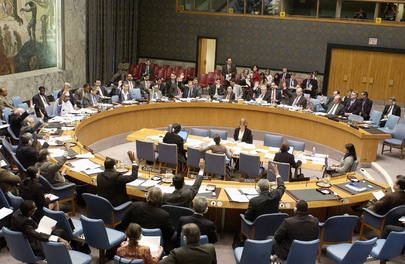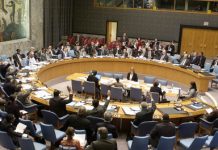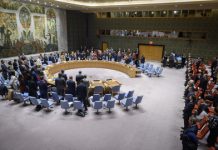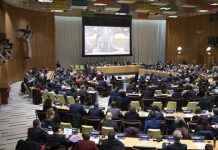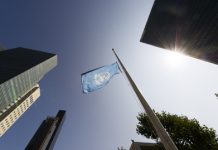“What Haitians want the most is peace, that will allow them to return to school, to farm their fields, to access basic services such as going to a hospital,” Edem Wosornu, Operations and Advocacy Director with the UN humanitarian affairs office, OCHA, said in a joint statement issued on Monday.
Ms. Wosornu visited Haiti alongside Lucia Elmi, Director for Emergency Operations at the UN Children’s Fund (UNICEF), and Andrea Koulaimah, Director for Latin American and the Caribbean for the European Civil Protection and Humanitarian Aid Operations (ECHO).
More Kenyan officers arrive
As clashes continue in Haiti, more than 578,000 people are displaced, and nearly five million – roughly half the population – are facing acute hunger, with 1.6 million at risk of starvation.
Last October, the UN Security Council authorized the deployment of a Multinational Security Support (MSS) mission to assist the beleaguered national police force in quelling the gang violence.
Kenya offered to lead the non-UN mission and international media report that another 200 of its police officers have arrived in Haiti, joining some 400 already there.
The violence has crippled Haiti’s agricultural sector – a key source of income for families – and disrupted education and healthcare. More than 900 schools have been closed since January, while in the capital, Port-au-Prince, nearly 40 per cent of all in-patient health facilities are out of service.
Impact on families
Furthermore, families who used to be economically independent have now lost income, thus affecting their access to food and healthcare. Most that have been displaced do not know if their children will be able to return to school.
The humanitarian delegation held meetings with senior Haitian officials, including new Prime Minister Gary Conille as well as authorities in the cities of Les Cayes and Gonaives.
They stressed that the international community must continue to support Haiti’s Government in providing life-saving aid and development assistance.
“Millions of families are yearning for an end to this relentless violence. It is critical to step up protection services for women and children – who are bearing the brunt of this crisis – and fast-track humanitarian assistance for those in need”, Ms. Elmi said.
Shortfall in aid
Back in February, the UN and partners launched a $674 million Humanitarian Response Plan for Haiti, but at the midpoint of the year it is less than a quarter funded.
The cost of inaction would be too high if response is not scaled up now, the statement warned, noting that international and local humanitarian partners have managed to find solutions to both access and assist Haitians throughout the country despite the challenging security situation.
While underlining the vital importance of humanitarian aid, the statement also stressed that Haiti’s challenges “are grounded in years of under-investment in basic social services and that humanitarian aid is a temporary fix that can’t solve the country’s deep-rooted, structural problems.”
The humanitarian response must be anchored into sustainability and serve as a “steppingstone to durable, sustainable recovery actions,” said Ms. Koulaimah.
“We call on the international community not to miss this unique momentum and to step up their efforts and mobilize resources to address the pressing humanitarian and development needs.”
Source of original article: United Nations (news.un.org). Photo credit: UN. The content of this article does not necessarily reflect the views or opinion of Global Diaspora News (www.globaldiasporanews.net).
To submit your press release: (https://www.globaldiasporanews.com/pr).
To advertise on Global Diaspora News: (www.globaldiasporanews.com/ads).
Sign up to Global Diaspora News newsletter (https://www.globaldiasporanews.com/newsletter/) to start receiving updates and opportunities directly in your email inbox for free.


